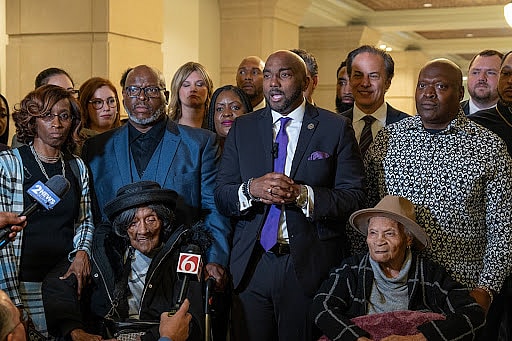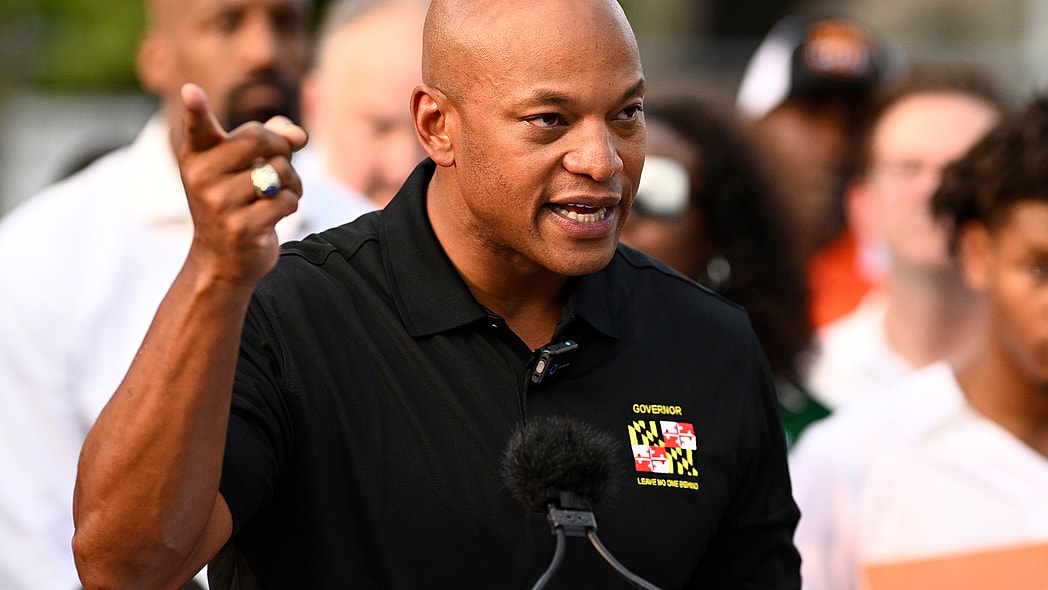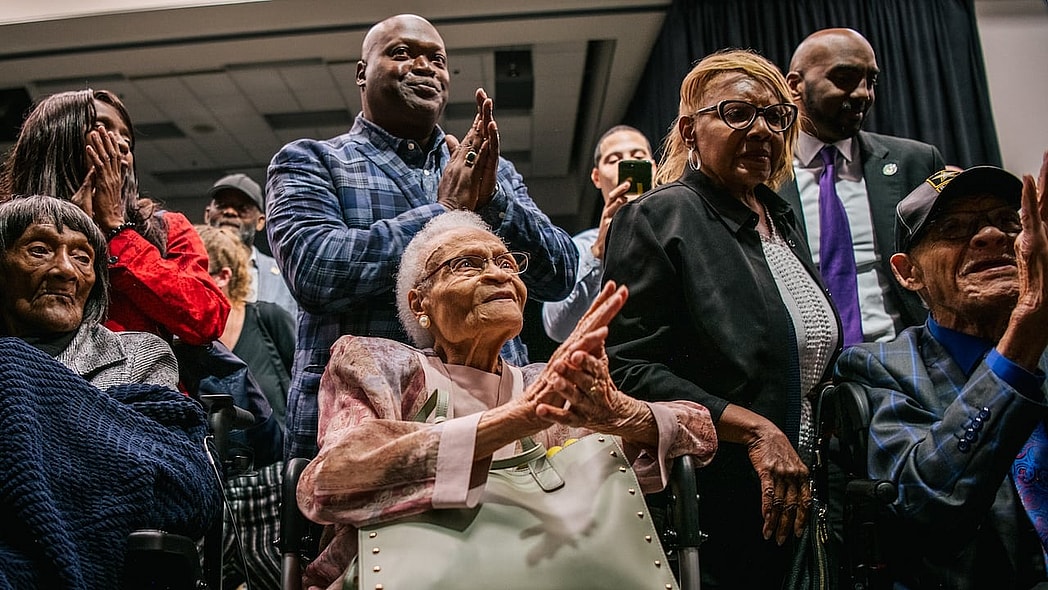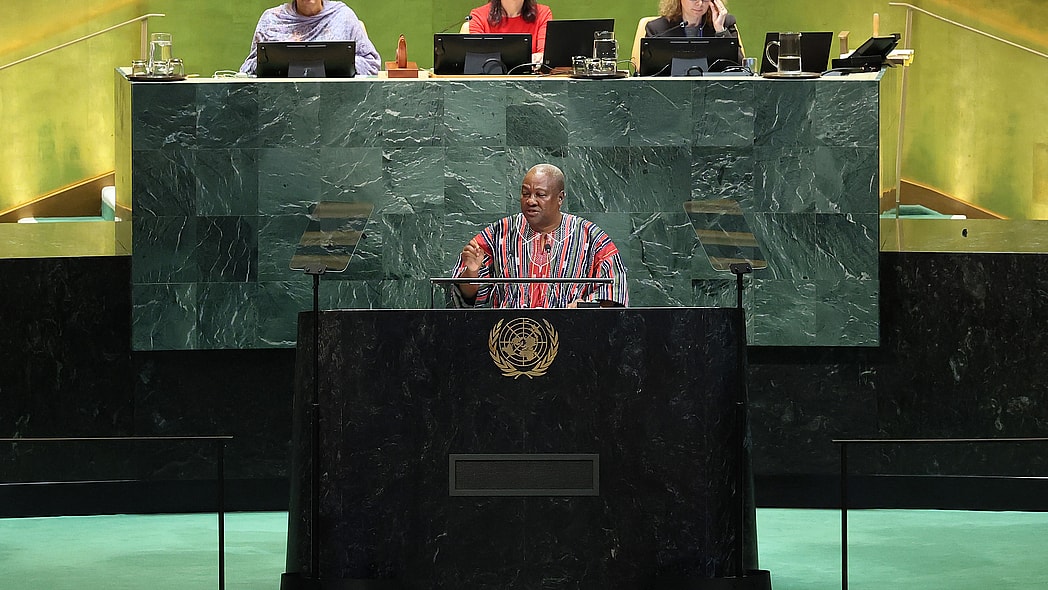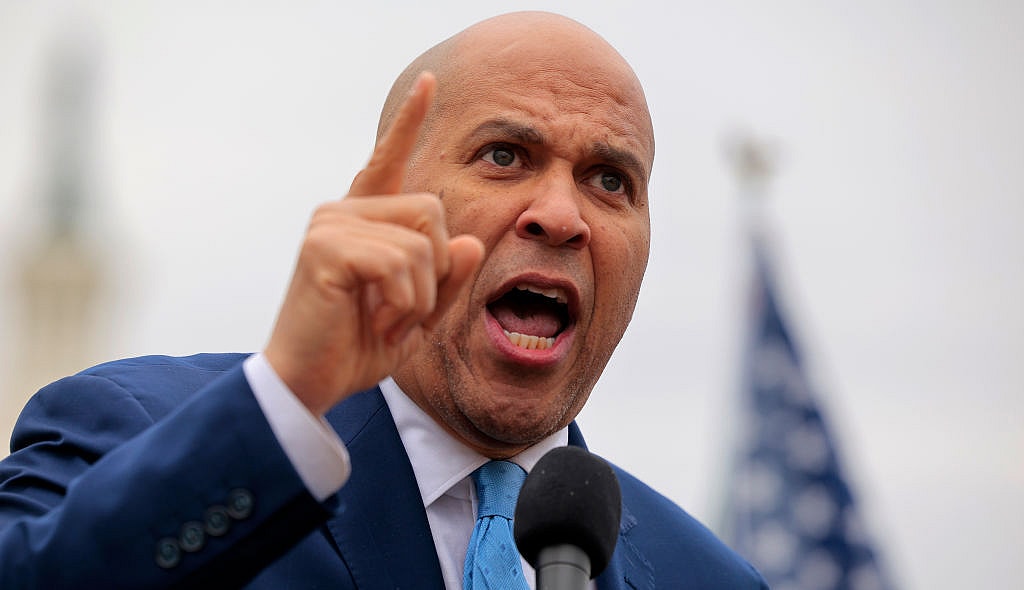For the first time in over a century, Oklahoma’s Supreme Court heard oral arguments Tuesday from attorneys representing the last two known living survivors of the 1921 Tulsa Race Massacre as they seek a revival of their historic case.
During Tuesday’s hearing, national civil rights attorney Damario Solomon-Simmons, who represents the survivors, asked the state’s highest court to reverse the July 2023 dismissal of the case.
“We want this court to reverse the prior decision and remand this case so I can start discovery as soon as possible as time is of the essence for these two 109-year-old survivors,” attorney Solomon-Simmons told the justices.
Lessie Benningfield Randle and Viola Ford Fletcher were children when thousands of white Tulsans – deputized by government officials – burned, bombed, ransacked, and massacred upwards of 300 Black men, women, and children in their neighborhood of Greenwood, home to the original Black Wall Street. No one has ever been held accountable for the city-sanctioned deprivation of life and property.
At nearly 110 years old, Randle and Fletcher looked on and listened from their wheelchairs as attorneys for both sides of the case made 30-minute rounds of oral arguments.
“Many have come before us who have knocked and banged on the courthouse doors only to be turned around or never let through the door,” Randle and Fletcher said in a joint statement ahead of the hearing. “Now, our pursuit of justice rests in the hands of our Oklahoma Supreme Court. They have the power to open the doors of justice and give us the opportunity to prove our case.”
The survivors are suing the city of Tulsa, Tulsa County, Tulsa Regional Chamber of Commerce, the Tulsa Sheriff’s Office, and the Oklahoma National Guard, formerly known as the Oklahoma Military Department, for their roles in perpetuating the massacre and alleged ongoing harms today.
Activist Tamika Mallory of Until Freedom walked across the marble floors of the Oklahoma Capitol building for the historic state Supreme Court hearing.
“While we want the whole pie, we have to be honest with ourselves that our start, our beginnings, our very foundation in this nation was oppressed,” she told theGrio following the hearing.
Some Black Tulsans have attended court hearings for decades in the hopes of seeing justice, only to be continually denied. If the two 109-year-old survivors can continue to stroll into a courtroom for justice, so can the rest of Black America, Mallory argued.

“There’s only going to be a few that have the courage, the wherewithal, and the moral clarity,” she explained. “I think that the benefit of whatever we enjoy is directly aligned with a willingness to keep the torch of the fight for justice, the fight for equity, the fight for freedom going.”
Chief Egunwale Amusan, a descendant of Tulsa survivors, business owner, and community organizer of the Real Black Wall Street Tour, said Tuesday marked the first time he walked out of an Oklahoma courtroom feeling hopeful.
“I think we’re living in a time of higher transparency and where the set of lies that have been agreed upon are no longer valid, and people are having to answer to the lies that have been told,” Amusan told theGrio.
His grandfather passed away the same year the U.S. Supreme Court dismissed a previous attempt at reparations for over 250 survivors of the massacre in 2001. For Amusan, hearing an Oklahoma Supreme Court justice acknowledge the harm perpetrated against his community and kin “was a really big deal.”
At the heart of the case is whether Tulsa County District Judge Caroline Wall erred in her decision to dismiss the case last year. Her ruling, which sent shockwaves through Black America, came after she previously signaled the case could proceed to discovery.
In an August 2022 order, Judge Wall ruled the survivors, which included 102-year-old Hughes Van Ellis at the time, met their burden of proof to plead an injury.
“The court finds Plaintiffs Randle, Fletcher, and Van Ellis, Sr. meet this statutory criteria, at least to withstand a motion to dismiss under Oklahoma’s liberal pleading code,” Judge Wall ruled.
Less than a year later, she reversed her own decision even after plaintiffs agreed to strike certain allegations from their petition in exchange for the defense allowing the case to proceed without dispute.
“Upon hearing the arguments of counsel and considering the briefs filed by counsel for plaintiffs and counsel for defendants, the court respectfully finds and orders the plaintiffs’ second amended petition should and shall be dismissed with prejudice,” Judge Wall wrote on July 13, 2023.
In her ruling, Judge Wall said she didn’t have the jurisdiction to determine a remedy for the harm caused by the massacre. Meanwhile, attorneys for the survivors have argued Oklahoma law doesn’t require them to provide a remedy abatement plan before a trial.
During the oral arguments, Oklahoma Supreme Court Chief Justice M. John Kane IV notably expressed confusion over why the case was dismissed without a discovery or trial phase.
Oklahoma Solicitor General Garry Gaskins, a member of the Oklahoma Attorney General’s Office defending the Oklahoma Military Department, drew a scathing response from Justice Noma Gurich after he questioned whether survivors Randle and Fletcher were “especially injured,” a requirement for the public nuisance law.
“We haven’t identified a public right” that was violated, Gaskins argued. In response, Justice Gurich asked, “How can there be any question that these plaintiffs have not been especially injured? I mean, did the military attack other neighborhoods in 1921?”
Over 35 square blocks of Greenwood were burned to the ground as bullet-ridden Black bodies lay dead on the streets. The Oklahoma National Guard forcibly marched Black survivors to internment camps across the city, where they were held for days at a time, according to the Tulsa Historical Society.
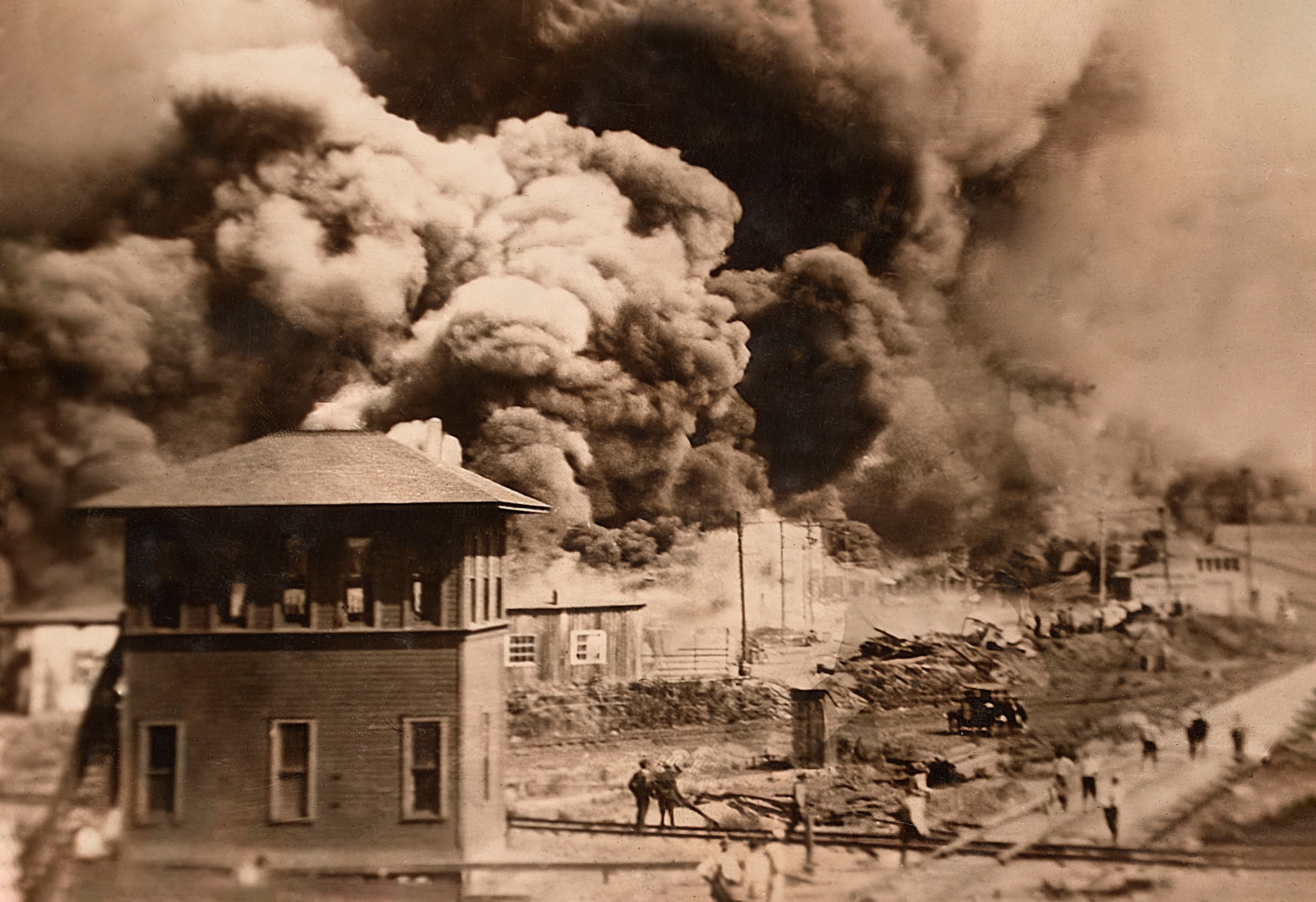
The justices’ sharp questions and vocal confusion over the dismissal of the case gave renewed hope to descendants of survivors.
State Rep. Regina Goodwin, a descendant of a Tulsa massacre survivor, represents Greenwood in the Oklahoma Legislature. As one of the most vocal supporters of reparations and repair, she attended the hearing and said she hoped at least five of the nine justices would do right for her community.
Goodwin wrote legislation that would provide a victim’s compensation fund for survivors and descendants and scholarships for descendants. The lawmaker is also studying a proposal to remove the stretch of I-244 that cuts directly through Black Wall Street. Despite facing setbacks in the Republican super-majority-controlled legislature, she’s running for state Senate with a mission to continue pursuing justice for Greenwood.
“They need to see the harm and the ongoing harm that even having events like this, where folks are questioning whether anything was injurious, is harmful,” Rep. Goodwin told theGrio. “I don’t know if they see that. I don’t know if they feel it. We do. We will continue to feel it and see it.”
For over 20 years, recommendations for reparations from a state-sanctioned commission have collected dust with little to no action. Data from Tulsa’s own Equality Indicators reports shows a nearly 10-year life expectancy gap between majority-Black residents of north Tulsa and majority-white south Tulsa.
“The longer harms go unaddressed, the more difficult and complex it will be to develop adequate reparation mechanisms that are proportionate to the gravity of the crime and to the harm caused,” the Human Rights Watch report noted.
Ultimately, attorney Solomon-Simmons argued the survivors had already met their burden of proof to proceed to a trial and that Judge Wall wrongfully dismissed their case.
Instead of using federal law, Solomon-Simmons utilized a state public nuisance law to argue the defendants caused harm that has never been abated. He also accused the defendants of unjustly enriching themselves through tourism gained by telling the survivors’ stories. The defendants argued the survivors have no claim to equitable relief and denied that they were victims of a public nuisance.
Tuesday’s hearing represented a potentially final effort to keep the case alive after Wall dismissed the survivors’ lawsuit with prejudice in July 2023, which means plaintiffs can’t refile the same case if the state’s high court upholds the dismissal.
However, if the Oklahoma Supreme Court reverses the dismissal, the case will go back to Tulsa County for the first-ever discovery and trial for survivors of one of the worst instances of racial domestic terror on U.S. soil.
For descendants like Amusan, it was relieving to hear his lived experience and the experiences of his ancestors validated by the justices of Oklahoma’s highest court. However, he still wants justice.
“So, let’s just tell the truth. Let’s demand justice with the truth,” said Amusan. “And then other people who see the truth will themselves say, ‘Wow, how did we not get this right?’”

